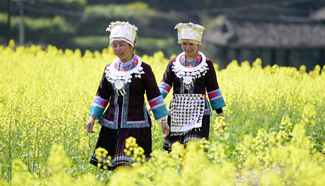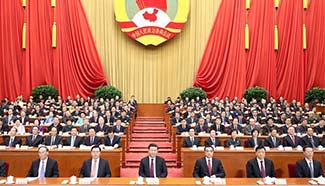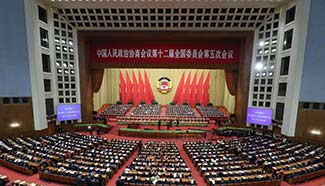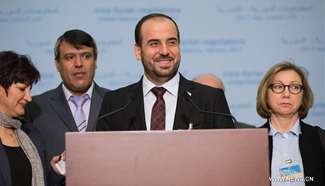BEIJING, March 4 (Xinhua) -- "My family was so poor that I almost married a man just because his family promised to buy us a bicycle," said Rayhangvl Emir, a Uygur lawmaker from northwest China's Xinjiang.
Emir is responsible for poverty alleviation and employment in a township in Kashgar, one of China's most westerly cities. At only 28 years old, she is in Beijing to attend the fifth session of the 12th National People's Congress (NPC), which opens Sunday.
Having been an NPC deputy for nearly five years, her proposals to past NPC sessions largely focused on employment and poverty alleviation, including one that led to the construction of a textile factory in her city, which will eventually employ 5,000 people.
This year, she will submit a proposal on vocational training in local city communities. Many Kashgar residents are not employed in factories and remain in poverty because they have no skills.
THE NINGBO CONNECTION
Emir had always wondered why some people were poor. Born in a small village in Akto County, she recalls walking to school in bare feet. She had no toys bought from a store and never even imagined such a thing.
Her life took a detour in 2007, when factory recruitment agents from Zhejiang Province came looking for workers.
Aspiring to a better life and naturally curious, she turned down the marriage proposal, and the bike, and went east to work in a textile factory in Ningbo with 40 others.
"The eyes of the villagers were filled with hate the day we left. No matter how hard life is, girls from my hometown are supposed to get married and work the fields with their husbands for the rest of their lives."
Her life in Ningbo was not easy at first. Neither she nor any of her fellows spoke much Mandarin and had none of the skills they needed for work. In only a few months, Emir was among the best workers in the factory, thanks mainly to the help and support of other workers who were also far from home.
"I earned about 4,000 yuan (580 U.S. dollars) a month," she said. "I was so happy. Back home, I had not been able to attend a college after graduation because my family could not afford the 5,000 yuan tuition."
Hearing of Emir's success, two of her elder brothers came to join her. With the money they made, the family built a brick house painted in brilliant blue and white, with 17 rooms, replacing the old three-room home made mainly of earth.
SENSE OF RESPONSIBILITY
Emir came to believe she had a responsibility to help others find prosperity. With her assistance, about 1,800 people from her home county came to work in Ningbo and, in 2012, she returned to Xinjiang to attend a vocational college in capital Urumqi, choosing as her major translation between Mandarin and Uygur.
"Mandarin is a must for job hunting outside Xinjiang," Emir said, and her new language skills have greatly assisted her poverty reduction work.
In 2013, she was elected an NPC deputy while still a student. After graduation, she became a civil servant in Kashgar. "With my experiences, and as an NPC deputy and a township official, I can help more people," she said.
In addition to helping people find work in eastern provinces, Emir and the local government are helping companies set up local factories.
Compared with 10 years ago, huge changes have taken place in the region, be the infrastructure, the economy or living standards. In Kashgar, factories are springing up everywhere, and leaving home to find a job is no longer the only option.
Xinjiang's regional economy grew by 7.6 percent in 2016, 0.9 percentage points above the national rate. Disposable rural incomes grew 8 percent to reach 10,183 yuan.
According to Emir, local development took off after the second central work conference on Xinjiang in May 2014, when central authorities began spending more on education and enrolled more children in school, in addition to adopting more poverty reduction policies in rural and border areas.
In recent years, a program known as "pairing assistance" has allowed other provinces and municipalities to offer financial and personnel support to Xinjiang, building new infrastructure and funding local industry. About 1.74 million people have been taken out of poverty since 2011. Most villages now have electricity and running water and can be reached by paved roads.
Asked how she gets around in Kashgar, Emir responded with a smile: she and her husband bought a car last year.



















